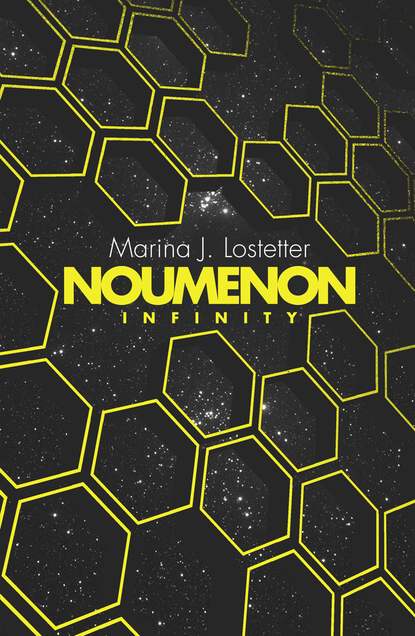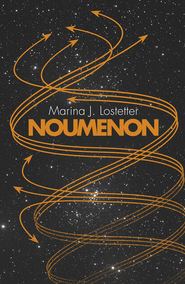По всем вопросам обращайтесь на: info@litportal.ru
(©) 2003-2024.
✖
Noumenon Infinity
Настройки чтения
Размер шрифта
Высота строк
Поля
Just as Divit had said, Vanhi’s face took up the screen. They’d landed on some news channel, and below her mouth—which hung wide, mid-sentence—was the headline:—entific Shakeup of Our Time; Twelfth Planet United Mission Canceled. New Mission to be Assig—
“What is this?” her father asked. “Why didn’t you tell us you were going to be on the news?”
Where on Earth did they get—? The cogs in her brain slowly rolled into place. It took her a moment, but eventually she recognized the clip. This wasn’t one of the recent interviews she’d given in Dubai. Her clothes, her hairstyle—they were from years ago.
I’m going to murder him. They won’t send me into space if I murder him.
It was a portion of a vid she’d help make in grad school. Some informational such-and-such they used in U of O recruiting.
She’d signed a waiver; the university could do whatever they wanted with the footage.
Apparently they wanted to hand it over to Dr. Kaufman to use as academic propaganda.
“What new mission?” asked Swara, inching up to take her son. She was Vanhi’s closest sibling, and not just in age. “They’re canceling the mission to TRAPPIST-One? But I thought that was our best bet for finding multicellular life. That was my favorite mission.”
It was the world’s favorite mission.
Dozens of expectant eyes tracked Vanhi’s every twitch. She hadn’t meant for this to come up now. Didn’t really need it to come up for years. Because she knew as soon as she tried to explain—
There would be so many different reactions. So many questions to field. She didn’t want to deal with them now. She got to come home so rarely; this was her first visit back in two years. She wanted to talk about Leah’s college applications, and Divit’s promotion, and Swara’s new engineering company. She wanted to play with little Hannah and give Ryan his bath.
She wanted to go fishing with her father and simply watch the river. She wanted to endure her mother’s never-ending attempt to clean out her closet by forcing Vanhi to take every pair of churidaar she owned—no matter how threadbare.
She wanted to casually mention her involvement in the new Convoy Twelve, to ease everyone into it, to reassure them.
She knew if her brother pressed Play that her face would swiftly disappear, followed close by Kaufman’s. Damn Kaufman and his need to make everything about him.
Behind her, Vanhi’s ma gasped. “You’re not—you’re not leaving are you?”
Vanhi’s heart constricted. Her mother sounded so pained. “No. I know what you’re thinking, and it’s not like the others—”
“So, you’re not going to space?” asked Parth.
“No, I am, but—”
Her mother clutched at her chest, spoon still in hand. “Arey!”
“It’s not like the others,” she insisted.
“Vanhi,” her father said sternly. “May we see you in my office?”
“Papa,” she groaned.
“Now,” he insisted, hoisting himself off the sagging couch.
The double doors closed heavily behind her papa, but they sat high off the wood floor, and the juncture between the two had no seal. There was nothing airtight—or, more importantly, soundproof—about the room. Her parents had long used this room when they wanted to “privately” chastise one of their children. It was part of how they kept the Kapoor pack in line.
But none of their children were children anymore. And yet old habits had a way of clinging, unnoticed, like mites.
The office was warm, the lights dim. Papa’s heavy oak desk took up the majority of the space, leaving only a cramped pocket for guest chairs. No one sat.
“I will let you explain,” her papa said. “But you must answer me this first: Why did you not think to discuss this with your family?”
Her ma’s eyes were wide, expectant.
But not patient.
“I was going to, soon. I’ve been under a gag order, though, and the consortium just lifted it. I wasn’t allowed to until now, and I was waiting for a good moment to tell everyone. But you need to understand, this new convoy isn’t like the others. It’ll be close enough for Earth-to-convoy supply runs. I’ll be up there for two years at a time, with six-month breaks back here. It’ll be no different than my living in Dubai. You won’t see me for a few years, but I only get to visit every few years now.
“We’ll be just outside the Oort cloud. I know that sounds far away, I know. But it’s not, and that’s what’s—what’s amazing about being alive now, working now, studying now. Distance doesn’t matter, it never has. Only time. It’s the time it takes to reach a place that makes it seem close or far away.
“They’re going to allow visitors, too. I get special passes. You won’t have to worry about the price of tickets or anything. So really, it’ll be better than now. We can see each other more often.” Maybe. Hopefully.
Tears cradled her mother’s eyes, but did not fall. She was difficult to read: Were these happy tears, scared tears?
Her papa’s face was blank, his gaze turned inward. “Isn’t space dangerous?” he asked.
Suddenly overwhelmed, Vanhi flung her arms around both her parents, and they squeezed her back. “Life is dangerous,” she said, with a laugh that covered a sniffle. “But you’d never expect me not to live it.”
DECEMBER 14, 2124 CE
The path from outside observer to Head of the “Littlest Convoy” (a nickname used both as an endearment and slight these days), felt longer than it had been, but by most measures was still shorter than it had the right to be.
All of the other mission leaders were gray by now, having devoted nearly the whole of their life’s work to this. Many were retired, and all but a couple had watched their ships disappear into the night.
Vanhi was still fresh, though. Not young by most standards, but nowhere near the end of her professional endeavors. For others, the P.U.M.s had been the entire book, but for her, the convoy was just a chapter, and an opening one at that. She’d taken up the reins as an outsider, not building from the ground up, but reassembling, reusing. It gave her a perspective the other heads didn’t have; she could be more objective, in a sense, as the convoy was not the only legacy she intended to forge for herself. It wasn’t even fully her idea—she wanted it, definitely, but she didn’t quite have the same level of emotional investment in her mission as others did in theirs. It was a job—an amazing job, but still a job, not a piece of herself. She knew there were plenty of colleagues that resented her position, and that made tomorrow’s “unveiling” all the more important.
The trip to the Moon had been a day’s jaunt—graviton-based systems were far quicker and more efficient than rockets—and she’d spent the evening in solitude, pouring over her speech notes while others wined and dined in the base’s mess hall.
Maranas Moon Base served as one of twenty in a network of staging grounds for the ships’ construction workers. Once the bases had served their function for the missions, they would be converted into colony habitats. The ships themselves were built and housed in construction yards set at two Lagrange points between the Earth and the Moon. On her ride out, Vanhi had caught a sharp zing of sunlight bouncing off something in the distance, and was sure she was looking at Twelve’s three ships. It was the same gleam that denoted a space station streaking across the sky on Arizona summer nights.
When she was sure the festivities had died down, and that all reasonable people had gone to bed, Vanhi left the base’s library. The room they’d allotted her was small and cramped—normally her favorite kind of working environment, but not this evening. She’d paced for most of the night, back and forth in front of the pressure-sealed shelves (the base’s collection of first edition books was one of its boasting points for intellectual tourists), repeating the key points of her speech over and over.
The base, though fifteen years old, still retained a strange, fresh-plastic scent. There was a sterile newness about it all, and an alien strangeness. It prickled her nerves.
The heels of her tennis shoes did not clop-clop-clop through the domed halls like pumps would have, which was a saving grace with her head already pounding. She needed some water, and at least four hours in snooze-town, and a big-ass breakfast before the press conference tomorrow.
C heard her mumbling about food. “There is a breakfast on tomorrow’s itinerary, though there is no indication of whether or not it will qualify as ‘big-ass.’”
Vanhi snickered as she slid her key card through the reader at an airlock door before proceeding into the next hall. “I’m sure it’ll be fine.”
“You’ll be happy to know idli is on the menu. I’ve noticed that, when it’s available, you choose to consume it as a first meal seventy-eight percent of the time.”
“Are they serving it with sambar?”
“No. Coconut chutney.”
“Monsters.”
Другие электронные книги автора Marina J. Lostetter
Noumenon




 0
0






